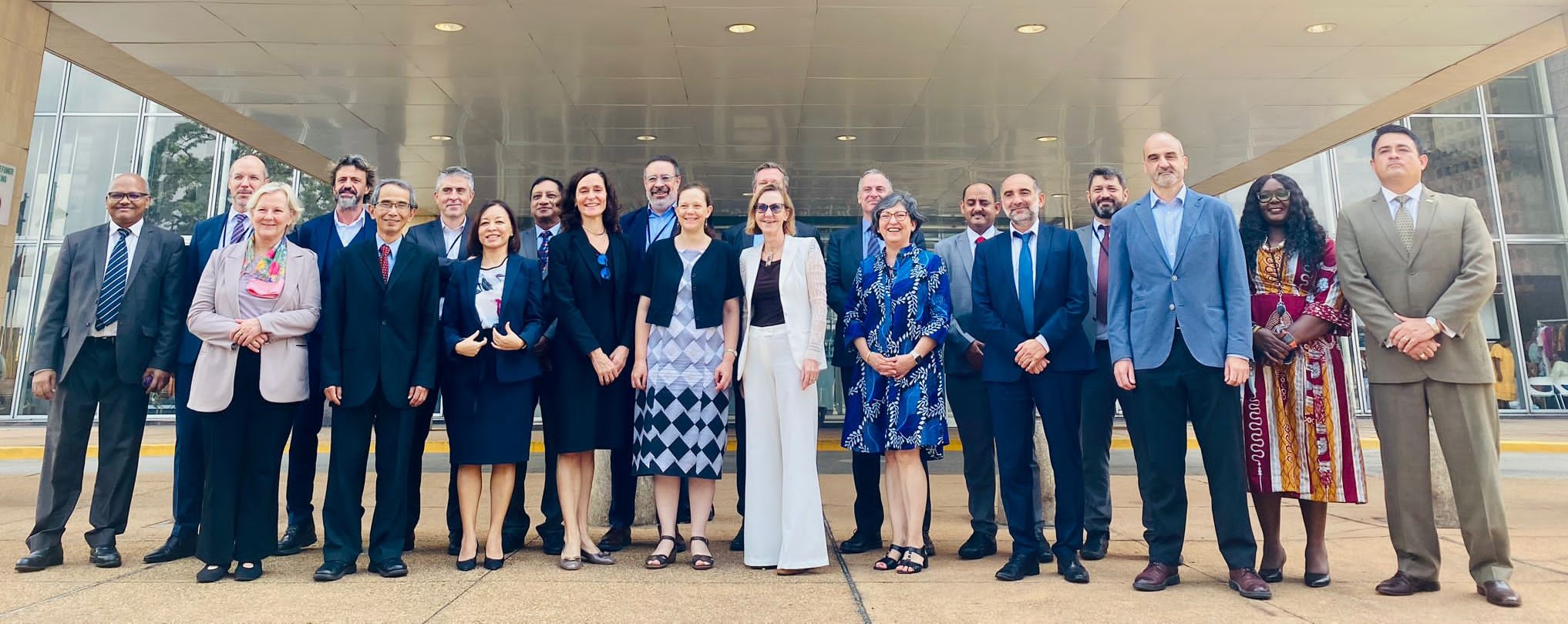IFAD leadership acts upon recommendations of evaluation on decentralization to achieve results on the ground - IOE
Rome, 7 November 2023 – Decentralization done right is essential to improve results achieved on the ground. To this end, the recent Corporate-level evaluation (CLE) of the Fund’s decentralization experience of the Independent Office of Evaluation (IOE) recommended more strategic planning, adequate resource allocation and fit-for-purpose country presence. IFAD Senior Management has taken immediate and far-reaching action to address each and every recommendation. Management presented these important new developments in detail during a learning event organized to discuss the CLE, on 7 November 2023.
“I appreciate the concrete actions that are being taken by IFAD leadership, and which have been reported. This demonstrates the strong commitment of Senior Management to addressing the issues captured by IOE’s evaluation report”, stated Dr Indran A. Naidoo, IOE Director, during the event.

Organized by IOE, the event was held in a hybrid modality with in-person participation of staff at IFAD headquarters and online participation of over one hundred and twenty-five field staff world-wide. The content was managed by IOE with active participation of IFAD Management. A very high number of Senior officials participated and took the floor, including four Associate Vice-Presidents (AVP), namely Donal Brown, AVP Programme Management Department; Jyotsna Puri, AVP Strategy and Knowledge Department; Guoqi Wu, AVP Corporate Service Department; and Alvarado Hernan, AVP, Chief Financial Officer and Chief Controller, Financial Operations Department.
The event aimed to promote better understanding across IFAD of the key evaluation findings and recommendations, and organization-wide discussions around how the evaluation informs the ongoing and future efforts to strengthen decentralization efforts. The workshop featured two main sessions. During the first, the IFAD AVPs presented the key changes to the decentralization approach introduced in response to this evaluation. During the second, Dr Naidoo moderated a panel discussion around the steps to strengthen the value-added by IFAD field presence, the efforts to improve adaptive management and course correction, and how the well-being of staff is being addressed in response to the evaluation recommendations.
Decentralization is widely recognized at the Executive Board, Management and staff levels as a necessary step to improve development results on the ground. Country presence brings IFAD closer to beneficiaries and governments, enhances partnerships with other development actors, and improves IFAD’s relevance and development effectiveness. However, the evaluation found that increasing outposted staff does not automatically translate into better support to development effectiveness. More to the point, the decentralization process was top down, not fully responsive to staff concerns and not adequately informed by the decentralization experiences of other International Financial Institutions and United Nations agencies as well as IFAD’s own earlier decentralization efforts.
“Inadequate time was available for effective adaptive management and learning. Actions did not adequately reflect the lessons from earlier decentralization experiences”, noted Dr S. Nanthikesan, IOE Lead Evaluation Officer, and lead author of the CLE, who helped conceptualize and organize this learning event.
Dr Nanthikesan also noted that the findings, conclusions and recommendations of the CLE were based on inputs received from a range of sources including an econometric analysis of all 588 projects completed by IFAD since 2003, as well as 15 country case studies (Bangladesh, Brazil, Burkina Faso, Cambodia, Côte d’Ivoire, Cuba, Djibouti, Egypt, Eritrea, Ethiopia, Kenya, Niger, Panama, Sudan, and Viet Nam). Inputs were also received from 686 interviewees with IFAD stakeholders in client countries, 807 online survey responses, and a comparative study of the decentralization experience of 8 other international financial institutions and UN agencies.
To ensure the that the existing momentum of the decentralization efforts, the Fund’s Senior Management has decided to address the shortcomings of IFAD’s decentralization process identified by the evaluation immediately with concrete actions.
Speaking at the opening of the event, Dr Brown provided an overview of how IFAD has responded to the specific evaluation recommendations. These include, among several others, increasing the budget for country programme delivery, increasing capacity building of country directors and operation staff, adopting measures to improve staff well-being and reducing vacancy rates, revising the reassignment exercise timelines to improve both personal and business planning, and taking proactive steps to provide the Executive Board with comprehensive updates on progress being made vis-à-vis IOE’s recommendations.
“These actions represent our commitment to improving our decentralization approach, and addressing the recommendations from the recent evaluation because we, as Management, want to do this right. We appreciate your support and cooperation”, explained Dr Brown in his intervention.
Dr Puri complemented Dr Brown’s remarks by providing insights into the strategic implications of decentralization changes in the organization. In particular, she highlighted that IFAD has developed a ‘decentralization recalibration plan’, which is already under implementation, and which is largely based on CLE recommendations.
“The plan maintains the decentralization commitment. Key elements include a review and further refinement of the global, technical anchor locations. It also includes comprehensive transition plans for headquarter-based general service staff, and addresses the number of IFAD country offices”, said Dr Puri.
The CLE brought to the fore many limitations related to human resource management, including the high vacancy rates and ensuing unsustainable workload for existing staff. Dr Wu addressed these over the course of the event. Regarding recruitment, the AVP explained that, since IFAD President Alvaro Lario took office in October 2022, the Fund has developed an action plan to reduce the high level of vacancy rates. One year later, the rate has fallen from 17%, at the beginning of 2023, to 11.4% in September 2023. Vacant positions in the field have witnessed a similar trend, with a drop in the ratio from 21.9% to 13%.
“With these lowered vacancy rates, we hope that IFAD will be better equipped to deliver in this challenging context. We are confident that we will be able to keep the vacancy rates even lower in the coming year“, Dr Wu affirmed.
Another topical issue that the CLE captured was that adaptive management was insufficiently integrated into the decentralization process. The overly ambitious timeline and targets limited the opportunities to correct course. Taking the floor to address these challenges, Mr Hernan clarified that IFAD finds itself in a dynamic phase, in which adaptive management has now started to play an important role and outlined several actions aimed at enhancing the Fund’s decentralization approach.
“Today, IFAD is delegating more decision-making authority to empower its global staff, including country directors and national officers. This delegation underscores our commitment to a more responsive and efficient organizational structure. IFAD is taking important steps to enhance monitoring of decentralized operations, and providing necessary support to standardizing business processes to reduce risks of error and fraud”, Mr Hernan highlighted.
The discussion panel that followed the first session with the AVPs further delved into the concrete steps outlined by the IFAD’s leadership to address the CLE’s recommendations. Panel members were chosen to represent the key stakeholder units spearheading the decentralization efforts and featured Sara Mbago-Bhunu, Regional Director of the East and South Africa Division, which the first regional office to become decentralized; Juan Diego Ruiz Cumplido, Head of the Multi Country Office in Peru; Juan Carlos Mendoza Casadiegos, Director of the Environment, Climate, Gender and Social Inclusion Division; Advit Nath, Director of the Financial Controller’s Division; and Candida Sansone, Director of the Human Resources Division.
The learning event established this CLE to be one of the most influential recent evaluations that has led to far-reaching management actions in a number of areas – ranging from human resource management to budget allocation to ensuring fit-for-purpose field presence. The event signalled the on-going commitment of IFAD’s leadership to take on-board the findings recommendations of the CLE report, and to strengthen the decentralization efforts under the current challenging circumstances.
For further information, please contact Alexander Voccia [here]
RESOURCES
- To access the corporate-level evaluation of IFAD's decentralization experience, please click here.
- To access the presentation that Dr S. Nanthikesan delivered during the learning event, please click here.
IOE 20th ANNIVERSARY


